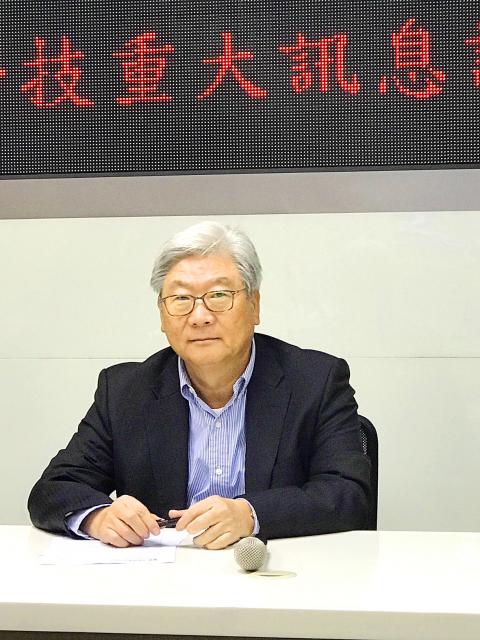Powertech Technology Inc (力成科技) yesterday said it plans to acquire two Japanese chip testers and packagers for at least US$86 million, targeting the fast-growing automotive and Internet-of-Things (IoT) markets in that nation.
The acquisitions would also allow Powertech, Taiwan’s biggest chip tester and packager, to expand its production sites to Japan.
“We have been wanting to build manufacturing operations in Japan to provide clients with complete solutions from chip probing to chip testing and packaging services,” Powertech chairman D.K. Tsai (蔡篤恭) told a media briefing at the Taiwan Stock Exchange yesterday.

Photo: Hung Yu-fang, Taipei Times
Powertech operates three overseas plants: one in Suzhou, China, and one in Xian, China, with US memorychip giant Micron Technology Inc, as well as one of its own in Singapore.
“Despite Japan’s setbacks in some semiconductor segments, Japanese firms are aggressively expanding by making chips used in vehicles and IoT devices. Those are the markets Poweretech intends to address,” Tsai said.
The acquisitions “would also provide easier access to the Japanese semiconductor market,” he added.
Powertech plans to submit a tender offer to buy a 39.6 percent stake in Tera Probe Inc for US$36 million from Micron Technology, after signing a series of agreements with Micron Technology and Micron Memory Japan Inc, the company said.
The equity investment would boost Powertech’s stake in Tera Probe to 51.2 percent from 11.6 percent, it said.
Based on the agreements with Micron Technology, Powertech also agreed to buy the US company’s stake in Micron Akita Inc for US$50 million.
Along with the deal, Powertech also inked a supply agreement with Micron Technology to take over most of its clients following the transaction.
Micron Akita mainly provides high-end chip probing or testing services for chips used in smartphones and other handheld devices, Powertech said.
The two transactions could cost a total of US$1.32 billion if Tera Probe shareholders accepted the tender offer, Powertech spokesman Evan Tseng (曾炫章) told reporters.
Powertech is offering to buy Tera Probe shares at ¥1,100 from April 17 to May 29, representing a 8.18 percent discount compared with the company’s closing share of ¥1,198 on Tokyo Stock Exchange yesterday.
Powertech expects the acquisitions to boost to its revenue growth. The company posted revenue of NT$48.34 million (US$1.59 million) last year and Tseng said the deals would add about NT$4 billion a year.
Powertech expects to wrap up the deals by July this year.
The transactions are subject to the approval of the Investment Commission.
Tera Probe, headquartered in Yokohama, had about 280 employees as of June last year, according to the company’s Web site.

CHIP RACE: Three years of overbroad export controls drove foreign competitors to pursue their own AI chips, and ‘cost US taxpayers billions of dollars,’ Nvidia said China has figured out the US strategy for allowing it to buy Nvidia Corp’s H200s and is rejecting the artificial intelligence (AI) chip in favor of domestically developed semiconductors, White House AI adviser David Sacks said, citing news reports. US President Donald Trump on Monday said that he would allow shipments of Nvidia’s H200 chips to China, part of an administration effort backed by Sacks to challenge Chinese tech champions such as Huawei Technologies Co (華為) by bringing US competition to their home market. On Friday, Sacks signaled that he was uncertain about whether that approach would work. “They’re rejecting our chips,” Sacks

NATIONAL SECURITY: Intel’s testing of ACM tools despite US government control ‘highlights egregious gaps in US technology protection policies,’ a former official said Chipmaker Intel Corp has tested chipmaking tools this year from a toolmaker with deep roots in China and two overseas units that were targeted by US sanctions, according to two sources with direct knowledge of the matter. Intel, which fended off calls for its CEO’s resignation from US President Donald Trump in August over his alleged ties to China, got the tools from ACM Research Inc, a Fremont, California-based producer of chipmaking equipment. Two of ACM’s units, based in Shanghai and South Korea, were among a number of firms barred last year from receiving US technology over claims they have

BARRIERS: Gudeng’s chairman said it was unlikely that the US could replicate Taiwan’s science parks in Arizona, given its strict immigration policies and cultural differences Gudeng Precision Industrial Co (家登), which supplies wafer pods to the world’s major semiconductor firms, yesterday said it is in no rush to set up production in the US due to high costs. The company supplies its customers through a warehouse in Arizona jointly operated by TSS Holdings Ltd (德鑫控股), a joint holding of Gudeng and 17 Taiwanese firms in the semiconductor supply chain, including specialty plastic compounds producer Nytex Composites Co (耐特) and automated material handling system supplier Symtek Automation Asia Co (迅得). While the company has long been exploring the feasibility of setting up production in the US to address

OPTION: Uber said it could provide higher pay for batch trips, if incentives for batching is not removed entirely, as the latter would force it to pass on the costs to consumers Uber Technologies Inc yesterday warned that proposed restrictions on batching orders and minimum wages could prompt a NT$20 delivery fee increase in Taiwan, as lower efficiency would drive up costs. Uber CEO Dara Khosrowshahi made the remarks yesterday during his visit to Taiwan. He is on a multileg trip to the region, which includes stops in South Korea and Japan. His visit coincided the release last month of the Ministry of Labor’s draft bill on the delivery sector, which aims to safeguard delivery workers’ rights and improve their welfare. The ministry set the minimum pay for local food delivery drivers at